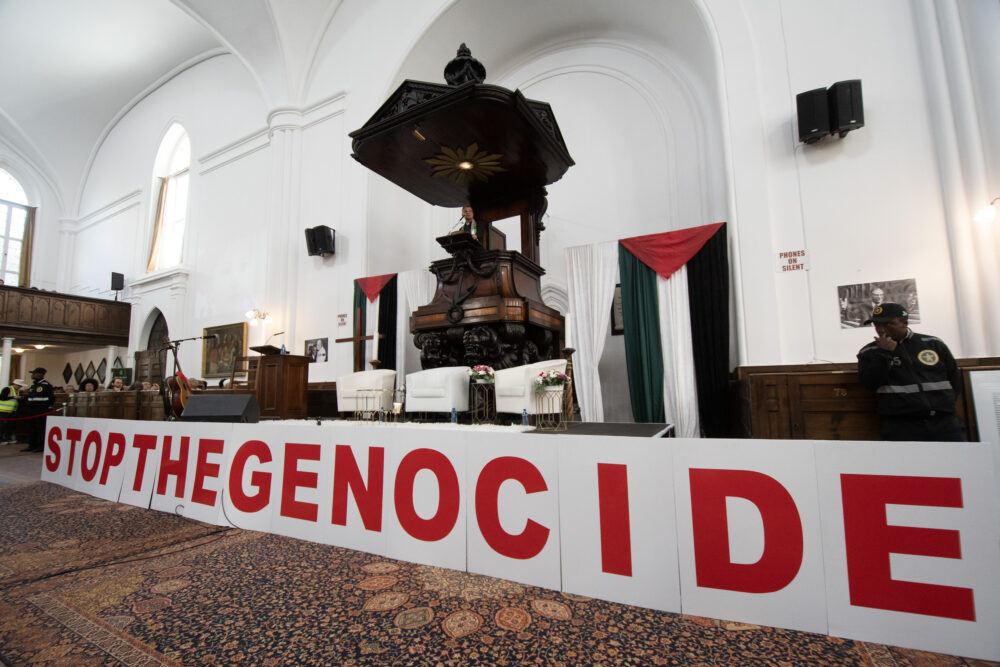UN Special Rapporteur on Human Rights in the Occuopied Territories, Francesca Albanese addressed a packed Groote Kerk in Cape Town om SUnday afternoon, 26 October 2025. Photo: David Harrison
The UN special rapporteur on the occupied Palestinian territories, Francesca Albanese, will present her report “Gaza Genocide: Collective Crime” to the UN General Assembly from The Desmond and Leah Foundation in Cape Town on Tuesday.
The report examines the complicity of third states in “the ongoing genocide in Gaza”, arguing that military, economic, diplomatic and even “humanitarian”, support for Israel has enabled its prolonged and systematic violations of international law.
Albanese is in South Africa at the invitation of the Nelson Mandela Foundation.
On Saturday, she delivered the 23rd Nelson Mandela Annual Lecture in Johannesburg, an address that challenged what she called the world’s moral collapse over Gaza and framed international law as “the last defence of our shared humanity”.
On Sunday, she was in Cape Town, at the Groote Kerk, the city’s oldest church, for a public discussion titled “Palestine and the Crisis of International Law”, hosted by the Palestine Solidarity Campaign, Gift of the Givers, Groote Kerk and the Nelson Mandela Foundation.
 UN Special Rapporteur on Human Rights in the Occuopied Territories, Francesca Albanese addressed a packed Groote Kerk in Cape Town om SUnday afternoon, 26 October 2025. Photo: David Harisson
UN Special Rapporteur on Human Rights in the Occuopied Territories, Francesca Albanese addressed a packed Groote Kerk in Cape Town om SUnday afternoon, 26 October 2025. Photo: David Harisson
Outside, Palestinian flags draped the façades along Adderley Street. A banner reading “Never Again” lay across the church steps. Another, at the intersection facing parliament, declared “Kick racist Israel out of Fifa”.
The square was cordoned off and security was tight. Volunteers directed a steady stream of people through the heavy wooden doors into the bright, arched interior.
Reverend Riaan de Villiers opened the evening with a reflection rather than a ritual.
“Today, this is a place of conscience.”
He spoke of the church’s own history, once a sanctifier of conquest, and of the danger of forgetting.
“Silence in the face of injustice is itself complicity. May we be the church that speaks out, not the church of silence.”
When Albanese took her seat, applause rippled through the hall.
“It is my honour and my joy to be in South Africa,” she began.
“This is a beautiful country that keeps the South in the spotlight.”
Reverend Riaan De Villiers
Her tone soon sharpened. “We have to name what happened,” she said, “because it affects every colonial achievement, the simplification that allows one to control the resources of others. The crime is not only in the land once called Palestine, even on the maps, but in the idea that some can take the land and remove the people. The British should be remembered as the nation that gave away what did not belong to them.”
She traced a line from imperial dispossession to present-day occupation.
“The same structures that justified slavery and apartheid now appear in different forms: possession, domination, even religious justification.”
Turning to South Africa’s case against Israel at the International Court of Justice, Albanese called it a moral hinge in global politics.
“South Africa has become a king in the return of the moral peace of the world, one of the few nations willing to act from the principles it once fought for.”
But she warned that morality alone was not enough. “Governments do not move from morality; it is people who push them there.”
Her challenge was direct. “We must stop exporting coal, stop economic cooperation, stop this complicity.”
Albanese’s analysis was dense with legal references but grounded in lived reality.
“You forcibly remove people from their land, destroy their homes, find them in the sea after the sun and then replace them. Possession, domination, destruction — these elements of settlement have become normalised.”
Quoting the International Court of Justice’s 2004 advisory opinion, she reminded the audience: “The right of self-defence cannot be claimed by an occupier against those whose land it occupies.”
“The right to resist,” she continued, “is a codified act of decolonisation. People who resist oppression have a high and unique right. This is what the law says.”
Her depiction of Gaza was unsparing. “The genocide in Gaza is history in the making, a genocide unfolding in real time. We are living through sustained violations of international law. The right to life itself is being negotiated,” she said.
“This is not the face of darkness that you have not known before,” she added. “Humanity has always been this. The slave trade endured because it was unbelievable — until people refused to accept it.”
Albanese returned to the question of complicity. “We have learned to coexist with atrocity. That is the death of conscience.”
Then came the appeal to ordinary citizens. “Check what you buy. Make sure there is no political choice hidden in what you purchase. Every small act matters. We need strong support from public opinion, from people who are not ruled by passion but by conscience.”
De Villiers closed the evening without ceremony. “May peace flow like water and justice like a river.”
It landed less as a blessing than an indictment.
Albanese’s words had turned the church into a chamber of witness, a reminder that the law without conscience is just another language of power.
That Albanese will address the UN General Assembly, and will do so from South Africa on Tuesday, is a coincidence. Yet it is fitting.
It is a reminder of how the country’s past still frames the world’s unfinished arguments about justice.